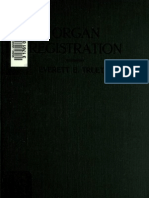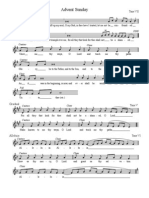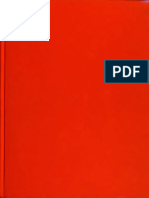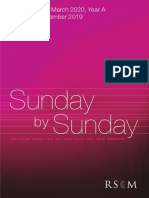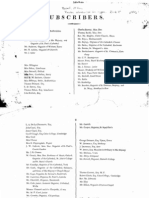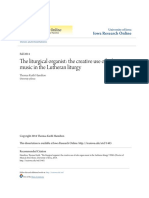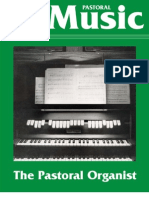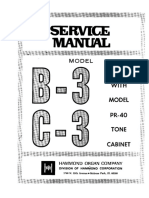Cinema Organ
Cinema Organ
Uploaded by
mifreCopyright:
Available Formats
Cinema Organ
Cinema Organ
Uploaded by
mifreOriginal Description:
Copyright
Available Formats
Share this document
Did you find this document useful?
Is this content inappropriate?
Copyright:
Available Formats
Cinema Organ
Cinema Organ
Uploaded by
mifreCopyright:
Available Formats
1.
50 ISSN 0958255X
210 Autumn 2001
Journal of the Cinema Organ Society
Vol. XLIX No. 210 Autumn 2001
P
SWELL PEDAL GREAT
COUPLERS
OBOE
8 ft
CONTRA
OBOE
16 ft
FIFTEENTH
2 ft
OPEN
DIAPASON
8 ft
ECHO
GAMBA
8 ft
CONTRA
GAMBA
16 ft
TREMULANT
TRUMPET
8ft
DULCIANA
MIXTURE
3 ranks
PRINCIPAL
4 ft
LIEBLICH
GEDECKT
8ft
VOIX
CELESTE
8 ft
OCTAVE
COR
ANGLAIS
8 ft
LIEBLICH
FLUTE
4 ft
DULCIANA
8 ft
SWELL
TO
CHOIR
CORNO DI
BASSETTO
8 ft
PICCOLO
2 ft
HOHL
FLUTE
8 ft
GAMBA
8 ft
FIFTEENTH
2 ft
PRINCIPAL
4 ft
OPEN
DIAPASON
No.2
8 ft
DOUBLE
DIAPASON
16 ft
TROMBA
8 ft
HARMONIC
FLUTE
4 ft
CLARIBEL
8 ft
OPEN
DIAPASON
No.1
8 ft
SWELL
TO
GREAT
GREAT
TO
PEDAL
LEFT HAND SIDE OF MANUALS RIGHT HAND SIDE OF MANUALS
OCTAVE
8 ft
GAMBA
16 ft
OPEN
DIAPASON
16 ft
GREAT
TO
PEDAL
CHOIR
(in a swell box)
BASS
FLUTE
8 ft
BOURDON
16 ft
OPEN
WOOD
16 ft
SWELL
TO
PEDAL
CHOIR
TO
PEDAL
The letter from Cameron Lloyd in the last
issue, regarding Maclean, the Trocadero
organ and the Blackpool approach has
prompted quite a response. Here is a
selection of your comments.
Blinkered?
From WAYNE IVANY
SHIRLEY, Surrey: Mr Lloyd seems to be the sort
of blinkered fellow who will only listen to one
type of theatre organ playing.
Why the vendetta against Quentin Maclean?
Dull as some of his commercial output may be,
particularly from Marble Arch, it can never be
described as boring, in fact some of his earlier
work at Shepherds Bush is quite delightful, and
most of the Troc records are refreshingly inventive.
I would also be a hypocrite if said I was not a
Reginald Dixon fan, and I believe we all owe a
debt of gratitude to Reg, but the lean years of the
60s werent so lean, as what was lost in commer-
cial recordings, (which incidentally dried up in the
middle of the war practically no commercial
organ records were issued after the war, with the
exception of Reginald Dixon and Joseph Seal),
was made up for in an at least one organ broad-
cast practically every day, and only one of these a
week featured Reg. Many other fine organists
broadcast throughout the 1960s, each one doing
his/her best to keep the organ popular and in the
public eye a fact Im sure Reg would readily
agree with, were he here today. It is unfair to
make any comparison between Reg and Quentin
Maclean, which is rather like comparing the
flamboyancy of Leopold Stokowski, with the
unassuming qualities of Sir Adrian Boult, both
being superb at what they did.
I also suspect that, according to Mr Lloyd, if its
not played in a certain style, then its not enter-
taining; likewise if the South Bank Wurlitzer does
not have screeching harmonic couplers, then it
takes on the more refined tonal characteristics of
a Good Compton a back handed compliment?
Finally, how many of us have said we dont like
something, never having tried it? Give Quentin
Maclean a break!
Hugely Popular
From DONALD INKSTER
NEW MALDEN, Surrey: Cameron Lloyd who is
he? Obviously not a member of the COS, other-
wise his address would be registered, and he
refers to your concerts. It seems he attends COS
concerts including those at the South Bank Uni-
versity and he knows a bit about our activities, so
perhaps he is a friend of a member. Like you, I feel
he should come clean and reveal his identity. And
maybe he should let us know which end of the
country it is where such strongly-held views are
said to prevail!
As to the South Bank Wurlitzer, of course it
does not sound as it did in the Trocadero and the
acoustical limitations of the Edric Hall are well-
known to us all. However, the notion that the
organ sounds like a good Compton trying to be a
Wurlitzer seems to me to make little sense. On
numerous occasions, whether by accident or
design, I have heard organists reproduce sounds
typical of Macleans registrations and it has to be
said that our American visitors have regularly
obtained typical American Wurlitzer effects on it
its all in there.
How anyone can rate Macleans music as dull
and boring is quite beyond me. With almost all of
his recorded output now available to us on CDs it
is possible to listen, learn and appreciate more
and more fully the sheer brilliance of his perfor-
mances. But the previous letter, from Hal Wilton,
surely supplies the real answer: Macs interludes at
the Troc were hugely popular with the audiences
there. His Wednesday morning broadcasts were
frequently attended by students from the Royal
Colleges who were there to see how it was
done and to gain from the experience. During
the war the Trocadero miraculously survived the
bombing and one can imagine what a terrific
morale-booster Mac would have been had he
stayed on.
Cinema Organ, 23 Aveling Park Road, London E17 4NS. Email: cinema-organ@leemingj.demon.co.uk. Fax: 0870 055 4990
What about a mention of Reginald Dixon?
asks Mr Cameron. Well, he gets them all the time,
doesnt he? There is hardly an issue of Cinema
Organ or indeed of the COS Newsletter in which
his name fails to appear. His contribution to the
organ as entertainment has never been in doubt
and that he has left a legacy of great value is
undeniable. Nevertheless, he was not top of every-
ones list (mine for instance). Success in show
business depends not only on material but also on
a recognisable personality and style of delivery. This
is true of organists just as much as of singers,
comedians and so on, and this is why we have such
clear memories of the great performers. Dear old
Robin Richmond often used to make this point
and he certainly practised what he preached!
Finally, Mr Lloyd states that the COS tries to
lecture, not entertain. I find this puzzling and invite
him and his friends at their end of the country to
elaborate a little, so that we have a better idea of
what they mean. The COS is dedicated to the
organ and organ music as entertainment and, if it
is falling down on the job in some way, construc-
tive criticism and sensible suggestions for
improvement would surely be welcome. The COS
is approaching its Golden Jubilee, so it cant have
been doing too badly over the years!
No Compton Clone!
From BILL SIBBEY
BRIGHTON, Sussex: I cant understand how
Cameron Lloyd can say the South Bank organ
sounds like a Compton trying to be a Wurlitzer.
What sort of Wurlitzers has he been listening to?
I know there are some boring sounding
Wurlitzers (small ones) which can be heavy going
on the ears, and I could understand it if the SB
organ was tonally bad, but it sounds like a first
class Wurlitzer to me and to all of the fine organ-
ists who play it.
I wonder if he has been to the States like a
number of us have and hear how the Troc organ
compares to some of their instruments. I think it
may have been Jim Riggs or Tom Hazleton who
said that it was the closest sounding, tonally, to the
Oakland Paramount that he knew. Is Cameron
only listening to CDs of the organ, or has he
heard it live? No way is it a Compton sound-alike.
Im looking forward to hearing the re-furbished
Troc Wurli when all the work currently being
done on it is completed. Keep up the good work.
A COS Welcome
From CHRISTOPHER THOMPSON
WOLVERHAMPTON, W. Midlands: I strongly
disagree with Cameron Lloyds comments about
the South Bank Wurlitzer. I am aware that this
instrument is not at its best at the present time
but to say it is not sounding good in my opinion is
nonsense. I have the Hills R Alive CD and must say
that of my 40 or so recordings, this certainly
sounds the most American of all Wurlitzers. In
some of the tracks I thought I was listening to the
Wurlitzer at the Chicago Theatre or Sheas Buf-
falo, New York. The registrations that Richard uses
are simply perfect.
Another comment Cameron made was that
Quentin Maclean was dull and boring. Personally
I am not very familiar with Macs playing so
cannot comment, but having to spoken to Mr
Lloyd himself a while back there are not many
organs and organists that Mr Lloyd does actually
like!
In a final note I would like to thank everyone
at Solihull for making me so welcome when I
went to a DIY night for the first time in July. We
have a superb instrument here in the West Mid-
lands. It is good to know that private practice and
open console sessions are available there.
That is the main reason why I am in the COS
the chance to play the instruments! A great pity
about the attitude of the people concerned with
the running of the other Compton organ we have
in the Black Country. We dont allow idiots to
ruin this organ was the reply when I asked if I
could have a play recently. (This venue is not
currently advertised in the COS concert listings).
Needless to say I dont attend the concerts there
anymore and they wont be getting my support. I
just hope this venue will have a look at their
attitude in years to come!
Thank you COS for the work you do and
encouragement you bring to people. A tip to
other societies who are keeping their consoles
behind bars: not only are you depriving
yourselves but the organ scene as a whole the
next person you deny console access to could
have been the Phil Kelsall or Nigel Ogden of the
future that you have just gone and lost forever!
What young person is going to sustain interest in
an instrument they are not allowed to play? Theyll
probably go straight out, buy a synth and join a
rock group!
I am going to be researching a large number
of our venues over the next 12 months and
finding out who allows me access and who makes
it difficult! I shall be writing my results in the
future. Watch this space!
I think youll be pleasantly surprised, Mr Thompson.
The great majority of theatre organ groups in this
country are very welcoming to young aspiring organ-
ists indeed, to players of all ages. Just look at the
success our young organists have had internationally
in the last couple of decades. That couldnt have
happened without organs for them to play! Ed.
Lift Up Your Head
From CLARK WILSON
EAST LIVERPOOL, Ohio: Regarding Cameron
Lloyds comments about Maclean, its interesting
how trained musicians and general auditioners alike
(both past and present) seem to feel quite the
opposite to him. The man was obviously a genius
and far out in front of his contemporaries. The fact
that his music holds up well 70 years later speaks
volumes. Of course, its well known that the world
usually hates its geniuses
I count that organ as one of perhaps the five
best Wurlitzers Ive ever heard or played (and
thats been plenty). It certainly sounds nothing like
anything but a Wurlitzer. With the vast mechanical
and tonal differences between these two types of
organs, how could anyone possibly confuse one for
the other?
If the statement refers to the sound as it was in
the 30s, well, what can we say? Were judging from
recordings, not real-time experience. Also, we must
remember that tremulants, regulation, and registra-
tion were generally quite different than they are
today. Often, many old organs seem to have shared
a similarity in tone for these reasons. However,
upon critical listening for a moment, there really
can be no mistaking any major brand for another.
What about Reginald Dixon and all he did to
keep the Theatre Organ going in the Sixties?
This sounds like the old arguments that we
used to have in the States about whether George
Wright or Jesse Crawford was better. Any com-
parison was folly; Crawford was the original, and
Wright was operating in a totally different set of
circumstances. George himself said this in referring
to the sacred memory of Jesse. Certainly the
same is true here. Maclean was first. He even
exhibited some stylistic playing on occasion (the
records bear this out) that leads one to wonder
who inspired whom! Why beat the horse?
Is the suggestion that you should have only C or
D grade entertainment? In my first-hand experi-
ences with the COS over the last eight years, I
have been impressed that the organization gener-
ally espouses a higher-than-usual ideal that some
other groups would do well to emulate. A little
education never hurt anyone. I recall a gentleman
once exclaiming to an organist Why, you played
over my head all evening. The good organist
replied Have you tried lifting up your head?
Indeed!
Anti-Blackpool? No!
From DONALD WOOD
BINGLEY, W. Yorkshire: The COS anti-Blackpool?
Nonsense. Just the opposite in fact, as you point
out [Editorial, Summer 2001], and I believe you
lean over backwards to be even handed. There is a
pro-Southern slant to the Newsletter but this is
understandable.
As for Reginald Dixon, he was a unique enter-
tainer exactly right for the times in which he lived.
At his pinnacle, he was just superb, as the tapes of
his broadcasts constantly remind us.
Those who have adopted a similar style have
reaped their own rewards but they could never
achieve his unique greatness. This is not to belittle
their efforts just the opposite in fact but times
and tastes have changed and the world has moved
on. But they have done well and we thank them
for it. Let us simply rejoice that, with so many tapes
and recordings to remind us, the memory of Reg is
still very much a part of our enjoyment of his
music and the Tower Wurlitzer which was such a
large part of his life.
I have been in touch with Mr Lloyd, and invited him to
enlarge on his views. His response is below. Ed.
A Starchy Feel
From CAMERON LLOYD
WOMBOURNE, Staffs: When I say that your
concerts lecture, I mean the way in which some
organists (usually those closely involved with the
COS) often start rambling on about tibias and
voxes, etc., which I feel is confusing to the general
public. They have come to hear the music, not get
baffled with science!
I should state that I am 20 years old (dont start
saying that I dont know anything about how a
theatre organ sounds). OK, I cant remember them
in the theatre, but the Tower Wurlitzer is, and I am
sure many will agree, very pleasing to the ear.
Having played quite a few theatre organs, including
the Tower Wurlitzer for dancing, I feel that the
Blackpool Sound is most popular.
I remember David Lowes cringe when I asked
about the quint and tierce couplers. This, to me,
sums up the general COS attitude. Reginald Dixon
seemed a bit of a no-no at the workshops, instead
I listened to hours of how to do this and that, but
learnt very little. Perhaps I got bored?
I did not say that the performances (recordings)
of Maclean were bad. The performances were, I
must admit, musically sound, but the way in which
they were played was boring. As for your state-
ment that the Trocadero Wurli is the most
Wurlitzer sounding in the country, who is to say
what a Wurlitzer should sound like? To me, the Troc
Wurli does not sound quite right. I do not wish to
insult the work that you do, it is good to know
these organs are looked after. I refer to the sound
which is most pleasing to sit and listen to. I do not
feel that the COS organs are pleasing to the ear,
with the exception of the Midlands District Comp-
ton and the Wurlitzer at Tywyn.
By this end of the country I refer to the
Midlands area. I attend quite a few concerts at
various venues, mainly in the Midlands, but some
out of the boundaries. I talk to many people who
do not like attending COS concerts due to their
starchy feeling. One elderly gentleman said that he
felt frightened to sneeze! This is no lie!
I dont profess to be an expert on organs. I play,
help out here and there, and have some knowledge
about tuning and maintenance. I merely wish to put
forward my opinions and the opinions of quite a
few other people, who, for some reason, seem
afraid to do so.
It is nice to know that the COS do not dislike
the Blackpool style, but I feel more could be put
into the workshops and journals about the Black-
pool side of things.
I hope Mr Lloyds letter will encourage these
people to put forward their views. The COS is always
pleased to receive comments and suggestions about
the way we operate, however critical these comments
might be Ed.
We now move sideways, but only just, this
time from a former Journal editor
MacFoort Again!
From DENNIS MATHEW
CHARTHAM, Kent: I think no-one could fault the
beauty and correctness of R. Foorts playing; and I
heard him, once, making a small church organ
sound magnificent (rather like Nigels handling of
these instruments. In that case, I must say that R.F.
had skill and imagination).
But, as I listen to a recent re-recording of some
of Q. Macleans masterpieces it is obvious that he
had the musical skills and hoc genus omne to make
him a superb innovator and arranger. One has only
to note the combinations that no-one else seemed
to discover, and the quotations from other com-
posers (in This Lovely Rose, a bit from
Rosenkavalier). The extraordinary versions of
numbers like Sing Brothers and Hold my Hand,
and of course, the fugal treatment of Night must
Fall and Free (was it?).
I think that Maclean showed himself therefore
to be a witty performer. Not necessarily a humor-
ist, or joker. He imported the atmosphere of the
town hall organist to his playing on the Wurlitzer at
Elephant & Castle. One cannot find a greater
compliment; but he was also familiar with perfor-
mers like Jesse Crawford the late Herbert
Norman told us once at a Saturday Meeting with
Gerald Shaw in the Regal, Marble Arch that Mac
would ask him,when the organ for Marble Arch
was being planned and constructed, if he could
make the Tibias like those on Jesse Crawfords
instrument (playing records to make his point).
Of course, there was Foorts Nightmare at the
Mosque, but that wasnt new sounds just a pot-
pourri of numbers which helped to demonstrate
the success of Cooks recording system. You may
have heard [too young to recall?] that apart from
the Vaughn records of G. Wright, the other ear-
opener was a small series of recordings made at
the Mosque (Richmond,Virginia).
As I write this, Hold my Hand has just come up
on the tape! Yes, one can see that Maclean made
each recording (3 minutes!) into a Production
Number.
One really got ones moneys-worth.
See also the vintage correspondence opposite Ed.
26
Theres Nothing New!
In this third issue of the year 2001, arguments continue to rage about the relative merits
or Maclean, Foort and Dixon. Donald Inkster, correctly anticipating an extended
correspondence column in this issue, sent some cuttings from issues of the Radio Times
following Leslie Barnards first article some 65 years ago. Not only were there similar rival
views around at that time, but they involved largely the same organists! In the extracts
reproduced below, note that Sidney Torchs name was mis-spelt almost every time.
Its interesting to see former Journal Editor Charles Hayles name amongst the
correspondents. Also, I wonder who the Rank and File Cinema-Organist from Hove was?
If we are still arguing the relative merits of many of the same organists after 65 years,
what does that tell us about the impact made by our present-day organist colleagues?
24
Ed Stout and a Bitsa
From IAN MACNAUGHT
EAST KILBRIDE, Strathclyde: I had a wry smile at
Ed Stouts swipe at those who choose to add bits
to their instruments (Summer 2001). I thought it
was a bit rich coming from Ed while at the same
time extolling the virtues of the Castro Theatre
Wurlitzer. Can we remember how many Wur-
litzers went into the making of the Castro, dare I
ask? Did they not just keep on collecting bits from
different organs, big and small, to add to their ever
growing pile? Somehow its OK to do something
yourself but dont copy me by doing the same
thing the your own little instrument. The pot
appears to be calling the kettle black.
On my last visit to the Bay Area I was, in fact,
struck by the fact that almost every Wurlitzer organ
there is a bitsa. Think of the list; Paramount, Oakland
composite instrument, Berkeley composite
instrument, Stanford the same. It begs the question,
is there an original Wurlitzer in the Bay Area? Now
dont get me wrong. Im not, in principle, against
adding additional Wurlitzer bits to an existing instru-
ment. But I think Ed should look round before
spouting off. We, the rest of us, will feel a bit less
guilty when we add that extra rank.
Regards Mortons, etc. After hearing some very
good sounding organs on the last ATOS conven-
tion in San Francisco, all Wurlitzers, I was gagging
for something different. The organs admittedly,
sounded well regulated, tremmed etc., but every
instrument had a sameness. It was as if they were
the same organ, the Paramount being the excep-
tion. I couldnt wait to hear a Compton again: now
theres something different! Thank goodness our
organs dont all sound the same. They might not be
as well regulated or trem absolutely properly but
they have one thing, and that is character. I think of
organs like the Walthamstow Christie or the
Clayhall Compton that give us unique sounds. I
remember being at the COS 40th Anniversary
concert at Clayhall, and Dudley Savage was at the
console. David Shepherd gave a lovely introduction
and then Dudley proceeded to enthral us with his
wonderful musicianship, using, of course, the Melo-
tone. He even brought one American visitor to
tears. The lucky chap said to me, Ive listened to
many many theatre organ concerts in my life, but
none has even made me cry with such enjoyment.
And this on a six rank Compton. I think anyone
who was there that day would agree, it was a
concert to remember.
What Ed Stout needs to do is turn his attention
to actually working on a Morton, Mller or Kimball.
By using his undoubted skills, Im certain he could
get any organ to produce beautiful sounds and,
incidentally, not by fitting Wurlitzer parts either. The
Bay Area could do with another instrument, other
than a Wurlitzer. This would broaden the scope of
examples of fine American organ building there
and provide ATOS with a more varied venue.
Aeolian Alive!
From RALPH WAGGETT
SEATON, Devon: I responded to John Morriss
invitation [Summer 2001] to visit his Aeolian
residence organ. Apart from the brief encounter
during the Scottish Convention [in 2000] (part of a
house tour) I was unfamiliar with the distinctive
character of the Aeolian organs. Paul gave a full
account of his instrument in his article and pictures
but a visit makes it all come alive.
The Aeolian company produced many organs in
the innovative period in the early twentieth cen-
tury, developing their own ideas. Neither
specification nor console followed either the
traditional classical models or the Wurlitzer
developments. With a diapason foundation, the
generous supply of flutes and strings, three distinc-
tive solo stops, a full set of couplers give
opportunity for an extensive range of sounds; the
two manuals are identical and tremulation pro-
duces a good cinema sound.
Paul has a large collection of standard rolls;
these are interesting, simply providing the holes to
trigger the notes and giving instructions for the
driver to follow registration, speed (levers and
volume (swell pedal)). So, sitting at the console one
turns the mechanical sequence into music of ones
own creation. In addition, Paul also has a Duo Art
organ player which does it all. I listened to Edwin
Lemare playing his composition Andantino in D-
flat followed by Pietro Yon playing Bachs Toccata
and Fugue in D-minor (at speed!).
Paul is good company and, whether its music or
organ construction, visitors will find that the con-
versation will flow; they will be made very
welcome. Performers inevitably receive the glory
but this is yet another reminder of our debt to the
practical people who work on these demanding
instruments.
Signature Tunes
From GEORGE BUCHAN
MILLTIMBER, Aberdeen: With reference to Mr
William Lewiss More Signature Tunes letter (Sum-
mer 2001), I only recognised two names on the list:
Allan Kennedy (Regal Cinema Glasgow): The
Road to the Isles
John T. McDougall (New Victoria, Edinburgh):
Wee McGregor.
From ARTHUR GAWEN
STROOD, Kent: Here are a few of the answers:
Cyril Busfield: One Alone
Wilson Oliphant: Till We Meet Again
Arthur Sudbury: Music, Maestro, Please
Alex Taylor: Alexanders Ragtime Band
James Whitebread: Serenade (Schubert)
Reginald Cross: Happy Feet
Ronald Greenwood: Where Theres You
Theres Me
Colin Howson: The Winds in the West
Allan Kennedy: The Road to the Isles
Wyndham Lewis: Ill See You in My Dreams
Gerald Masters: Smile, Darn You, Smile
All the time Reginald New was at the Beaufort
Cinema, Washwood Heath, he used no signature
tune, but he did when he later transferred to the
Regal, Kingston-on-Thames.
Quentin Maclean used no tune when doing all
those Wednesday lunch-time broadcasts from the
Trocadero. However, when he was heard on the
radio a couple of times in the evening, I remember
hearing him sign off with Knocked em in the Old
Kent Road. I assumed that he did so because he
had finished the advertised programme a minute
or so early.
From DON HICKLING
NORTHAMPTON: Signature tunes, mainly from
the splendid lists compiled by Allan Moyes:
Colin Howson: The Winds in the West
Alexander Fryer: The Friar of Orders Grey
Max Gerald: Ship Ahoy
Allan Kennedy: The Road to the Isles
Herbert Steele: Smiling Through
James Bell, when resident at the Carlton,
Tuebrook, used his own composition Down
Mersey (copies given to the audience during the
opening week)
Raymond Charles: Over My Shoulder
Harold Nash: Northants Regimental March
and, for broadcasts, Because of You Theres a Song
in My Heart
Jack Coombs: Whispering
Lew Harris: A Melody from the Sky (a film
song from the mid-30s).
From RON LAKE
HORBURY, W. Yorkshire: Joseph Seal made in
house recordings for use on the ABC circuit. One
of these was indeed At Your Service but to my
knowledge, this was used only for accompaniment
to silent or non-sync ice cream sales advertise-
ment films. These would be shown after the second
feature, at the start of the interval, and finish with
the spotlight on one or more of the sales girls as
the houselights came up.
The Puzzle Picture
From TONY MOSS
CROYDON, Surrey: The picture on p.26
[Summer 2001] is of vocalist Al Bowlly and
accompanist George Scott-Wood at a recording
at the EMI Compton, Abbey Road Studios, on
May 25, 1938.
The titles recorded were:
OEA-3629-1: Goodnight Angel
OEA-6330-1:When the Organ Played Oh
Promise Me
(HMV BD-565)
OEA-5331-1, -2: Maria, My Own; Marta
OEA-6332-1, -2: Stormy Weather; Brother Can
You Spare A Dime?
(Rejected)
On Monday, April l4, 1941 Al Bowlly com-
menced a weeks engagement at the Rex High
Wycombe with Jimmy Mesene Two Voices and
Guitars in Harmony. The organ, installed in that
year, was a Hammond LaFleur and a new organist
was engaged that week. He had no accompani-
ment experience and, in the middle of Buddy, Can
You Spare a Dime?, Al Bowlly raised his guitar
menacingly and told the unfortunate organist that
he was killing the act. A local church organist was
recruited the next day and filled in for the rest of
the week.
Al Bowlly was killed in the London blitz on the
Wednesday.
Thanks also to replies from Basil Bonner, Ray
Webb and Clem Wroth. Ray says, George Scott Wood
was a great pianist but no organist!
30
28
The
Society
For those interested in organ music as entertainment
You might also like
- Beginning OrganDocument18 pagesBeginning OrganRogerio Lima89% (9)
- Soderlund - Young Person's Guide To The Pipe OrganDocument14 pagesSoderlund - Young Person's Guide To The Pipe OrganWaltWritman100% (1)
- Idiots Guide To Organ RegistrationDocument8 pagesIdiots Guide To Organ RegistrationJoshuaNichols100% (4)
- Beginning OrganDocument18 pagesBeginning OrganRogerio Lima89% (9)
- St. Scholastica Hymnal Organ Book PDFDocument102 pagesSt. Scholastica Hymnal Organ Book PDFEduardo Vasconcellos JrNo ratings yet
- Organ Registration - 272-Pages - Comprehensive Guide by Everette E Trudette - 1919Document272 pagesOrgan Registration - 272-Pages - Comprehensive Guide by Everette E Trudette - 1919Church Organ Guides100% (13)
- Cantantibus Organis - Book 19Document77 pagesCantantibus Organis - Book 19Gabriele CofanoNo ratings yet
- The Sarum/English GradualDocument99 pagesThe Sarum/English Gradualcosmojones100% (1)
- Pachelbel Organ WorksDocument253 pagesPachelbel Organ WorksIbrahim Merel100% (1)
- Improvisation On The OrganDocument69 pagesImprovisation On The Organppiccolini100% (23)
- JT3020 Mach 1/all Terrain: Operator's ManualDocument245 pagesJT3020 Mach 1/all Terrain: Operator's ManualВіталій ЖуравельNo ratings yet
- Henry MuletDocument59 pagesHenry MuletAnton DoornheinNo ratings yet
- Theatre Organ SecretsDocument23 pagesTheatre Organ SecretsValerie Ilari Martini100% (1)
- Manual OrganistaDocument27 pagesManual OrganistaCarmelo Hoyos100% (3)
- Julius Andre's Organ BookDocument90 pagesJulius Andre's Organ Bookmontuno86% (7)
- Liturgical Organ Music WEBDocument330 pagesLiturgical Organ Music WEBФёдор Скопин100% (3)
- Poulenc, Francis - Organ Concerto in G Major (Organ Part)Document25 pagesPoulenc, Francis - Organ Concerto in G Major (Organ Part)isseauNo ratings yet
- Organ MusicDocument137 pagesOrgan Musicantonio valdez100% (4)
- Organ RegistrationDocument7 pagesOrgan RegistrationErma Sandy LeeNo ratings yet
- Buck - Vox Organi PDFDocument138 pagesBuck - Vox Organi PDFAndreaMeroni100% (1)
- 540-604 - Organ Accompaniment of TheChoral Service - 00 - CADENCIAS MODALESDocument86 pages540-604 - Organ Accompaniment of TheChoral Service - 00 - CADENCIAS MODALESCarlos Gutiérrez100% (3)
- Linley Practical Introduction To The Organ c1795Document5 pagesLinley Practical Introduction To The Organ c1795AdrianNo ratings yet
- Boellmann Fantasie Dialoguee OrganDocument19 pagesBoellmann Fantasie Dialoguee Organmusiccentersf100% (2)
- By U Organ Workshop Packet 2017Document34 pagesBy U Organ Workshop Packet 2017Adrian100% (7)
- The Technique and Art of Organ Playing (Dickinson, Clarence)Document276 pagesThe Technique and Art of Organ Playing (Dickinson, Clarence)Ambroise100% (9)
- AGO Summer RecitalDocument12 pagesAGO Summer RecitalTimothy BelkNo ratings yet
- William Croft Voluntary in DDocument4 pagesWilliam Croft Voluntary in DIvan Rakonca67% (3)
- Dictionary Organ Stops Wedgewood PDFDocument248 pagesDictionary Organ Stops Wedgewood PDFJuanma Santos100% (3)
- Organ BookDocument23 pagesOrgan BookMyc-lNo ratings yet
- Hymn Accompaniment - Organ Playing - HullDocument286 pagesHymn Accompaniment - Organ Playing - HullChurch Organ Guides96% (28)
- An Explanation of Organ Stops - Locher - 100-Pages - 1888Document100 pagesAn Explanation of Organ Stops - Locher - 100-Pages - 1888Church Organ Guides91% (11)
- Sbys90 PDFDocument56 pagesSbys90 PDFDaniel Marks100% (1)
- 24 Voluntaries For The Organ (Russell, William)Document108 pages24 Voluntaries For The Organ (Russell, William)geremieromeoNo ratings yet
- Archer-12 Organ Preludes Op2Document61 pagesArcher-12 Organ Preludes Op2Jerald Franklin Archer100% (7)
- Moorman - Chalenge Teaching Organ To YouthDocument9 pagesMoorman - Chalenge Teaching Organ To Youthmanuel1971100% (1)
- Prélude, Adagio Et Choral Varié Sur Le Thème Du 'Veni Creator', Op 4Document1 pagePrélude, Adagio Et Choral Varié Sur Le Thème Du 'Veni Creator', Op 4Vincenzo NocerinoNo ratings yet
- Holy God, We Praise Thy NameDocument4 pagesHoly God, We Praise Thy NameKBHR47No ratings yet
- 39087009930571score PDFDocument286 pages39087009930571score PDFdenieren 3421No ratings yet
- Wiliam Croft Voluntary in CDocument4 pagesWiliam Croft Voluntary in CIvan Rakonca100% (1)
- Liber Organi Vol 2 Organ Music Italian French Schools Dalla Libera PDFDocument92 pagesLiber Organi Vol 2 Organ Music Italian French Schools Dalla Libera PDFSonia Pascual Hernandez100% (1)
- The Liturgical Organist - The Creative Use of Solo Organ Music inDocument77 pagesThe Liturgical Organist - The Creative Use of Solo Organ Music inredlandadamNo ratings yet
- Silent Film Music and The Theatre Organ: Indiana Theory ReviewDocument37 pagesSilent Film Music and The Theatre Organ: Indiana Theory ReviewGeorge antonNo ratings yet
- R. Cockraft - CarillonDocument4 pagesR. Cockraft - CarillonIvan Rakonca100% (1)
- 15 Music PDFDocument6 pages15 Music PDFitsirene100% (1)
- Organ Music A March AlbumDocument62 pagesOrgan Music A March AlbumCharlotte Vandichel100% (14)
- West Melvin 1959Document257 pagesWest Melvin 1959Jiack4theLordNo ratings yet
- Mormon Tabernacle Organ StoplistDocument4 pagesMormon Tabernacle Organ StoplistAllen Blodgett100% (2)
- BOSSI REDEMPTION ORGAN SoloDocument7 pagesBOSSI REDEMPTION ORGAN Solomusiccentersf100% (1)
- Bruckner Prelude D Organ PDFDocument1 pageBruckner Prelude D Organ PDFRenato AlmeidaNo ratings yet
- The Wanamaker Grand Organ PDFDocument18 pagesThe Wanamaker Grand Organ PDFAfonso24No ratings yet
- Cuthbert Harris Toccatina in CDocument7 pagesCuthbert Harris Toccatina in CIvan Rakonca100% (1)
- Marcel Dupré PDFDocument214 pagesMarcel Dupré PDFAndré Bandeira100% (1)
- Hymn Accompaniment - Richards - 1911Document208 pagesHymn Accompaniment - Richards - 1911Church Organ Guides89% (36)
- Transformations-Preludes and PostludesDocument39 pagesTransformations-Preludes and PostludesOskr ArTuro100% (3)
- Bach 18 Chorale Preludes BWV 651-668 (Organ Music Score) (68S) PDFDocument68 pagesBach 18 Chorale Preludes BWV 651-668 (Organ Music Score) (68S) PDFEnricoLucaNo ratings yet
- Fortyfour SchneiderDocument56 pagesFortyfour SchneiderJosué Reséndiz Mendoza100% (2)
- Froberger Fantasias Only Use 6 OrganDocument22 pagesFroberger Fantasias Only Use 6 Organmusiccentersf100% (1)
- Modal Responsorial Psalms - 5th Sunday of Lent Years ABCDocument3 pagesModal Responsorial Psalms - 5th Sunday of Lent Years ABCAristotleAEsguerra100% (1)
- Organ Performance Study GuideDocument2 pagesOrgan Performance Study GuideDavid LinaresNo ratings yet
- Church Music - The Pastoral OrganistDocument9 pagesChurch Music - The Pastoral OrganistDennis50% (10)
- CatalahoDocument36 pagesCatalahoLucia Tavernar100% (3)
- On Organ Playing - Hints to Young Organists, with Complete Method for Pedal Scales and ArpeggiosFrom EverandOn Organ Playing - Hints to Young Organists, with Complete Method for Pedal Scales and ArpeggiosRating: 3 out of 5 stars3/5 (1)
- ST Annes Organ InfoDocument9 pagesST Annes Organ InfoDavid GarrisonNo ratings yet
- 1505MDocument6 pages1505Mandrzej22% (9)
- Manual Bicicleta Eliptica Nordictrack e 110Document32 pagesManual Bicicleta Eliptica Nordictrack e 110Emil StanimirNo ratings yet
- ACT NordicTrack Owners ManualDocument32 pagesACT NordicTrack Owners ManualMr D.No ratings yet
- Pipe Organ - WikipediaDocument22 pagesPipe Organ - WikipediaAla2 PugaciovaNo ratings yet
- ManualDocument32 pagesManualmoshesaNo ratings yet
- Hauptwerk Custom Organ Design Module User GuideDocument80 pagesHauptwerk Custom Organ Design Module User GuideMarco MessinaNo ratings yet
- Notre-Dame de ParisDocument157 pagesNotre-Dame de ParisEm PeeNo ratings yet
- HauptwerkInstallationAndUserGuide PDFDocument316 pagesHauptwerkInstallationAndUserGuide PDFMarco MessinaNo ratings yet
- Bach's Organ Registration - W. SumnerDocument83 pagesBach's Organ Registration - W. Sumnercedric100% (5)
- Yamaha Organ Sales Brochure 1981Document16 pagesYamaha Organ Sales Brochure 1981ragtimepiano100% (1)
- B3 Service Manual HammondDocument73 pagesB3 Service Manual HammondPippo GuarneraNo ratings yet
- Hauptwerk Installation and User GuideDocument316 pagesHauptwerk Installation and User Guideanubis7770% (1)
- Spin Prod 1025892812 Elliptical SearsDocument36 pagesSpin Prod 1025892812 Elliptical SearstiggrdaveNo ratings yet
- The Hammond Organ Manual For The SERVICE ENGINEER-2016Document358 pagesThe Hammond Organ Manual For The SERVICE ENGINEER-2016Sherman L. Burks100% (2)
- L'Orgue de Le Basilique Notre DameDocument5 pagesL'Orgue de Le Basilique Notre DameGibson MacMillanNo ratings yet
- Regent 356Document4 pagesRegent 356gutsylizNo ratings yet
- BVS5000 Operators ManualDocument33 pagesBVS5000 Operators ManualFrancoarqNo ratings yet
- Roland C230Document9 pagesRoland C230Anonymous pMgjvHvC41No ratings yet
- Organ BrochureDocument2 pagesOrgan BrochureKurt CollinsNo ratings yet
- Quick Manual - Roland C330Document2 pagesQuick Manual - Roland C330Alexandre Gonçalves AndrelinoNo ratings yet
- Wicks Organs Technical GuideDocument18 pagesWicks Organs Technical Guidenarteyw626No ratings yet
- Hammond X-77 and X-77 GT Service Manual2 OCRDocument161 pagesHammond X-77 and X-77 GT Service Manual2 OCRMartin L'AllierNo ratings yet
- Organ Bench InfoDocument3 pagesOrgan Bench InfopaulusplusNo ratings yet
- Culture and Values A Survey of The Humanities 8th Edition Cunningham Test Bank 1Document36 pagesCulture and Values A Survey of The Humanities 8th Edition Cunningham Test Bank 1yolandarichardsqiyrfwmazc100% (42)
- The 88E ManualDocument6 pagesThe 88E ManualRoss Moore,JrNo ratings yet
- 550108B (CONSOLE-ULTRA-ing-FREE-VERSION)Document20 pages550108B (CONSOLE-ULTRA-ing-FREE-VERSION)Vladimir Krivenok100% (1)
- Johannus Orgels Folder Ecclesia EngDocument20 pagesJohannus Orgels Folder Ecclesia EngEduard AntalNo ratings yet




